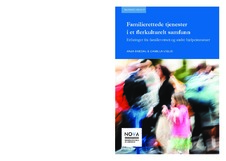| dc.description.abstract | This is the report from a research project commissioned by The Norwegian Directorate for Children, Youth and Family Affairs (Bufdir). The research topic was family counselling and other services for families, couples and individuals who experience relational challenges and conflict, with a particular focus on families of immigrant background. What kinds of services are available apart from the public Family Counselling Service? [1] And, what are the experiences of such services when it comes to dealing with the specific challenges and needs of ethnic minority clients? We have investigated the experiences of family therapists within the public Family Counselling Service and of professionals and volunteers within some other organisations. Thus, the data material consists of two parts: 1) Qualitative interviews with representatives of two municipal psycho-social teams, three NGOs and five faith communities (Christian and Muslim) that offer counselling and other services to families of immigrant origin. The NGOs and faith communities have users with origin in Eastern Europe, the Baltics, Asia and Africa. Four of the organisations work primarily with parent-children cases, while two primarily deal with couples, and four target both groups. 2) Group interviews and individual interviews with family therapists working in three public family counselling offices. The interviewees agree that clients of immigrant background are probably underrepresented among the users of the Family Counselling Services. They also share some assumptions about the reasons behind this possible underrepresentation. According to our informants, immigrants may be less aware of these services or they are misinformed. For some, it may be a question of a general skepticism against state agencies, based on experience from their countries of origin. The interviewees also suggest that the negative reputation of the child welfare services has rubbed off on the family counselling services. Furthermore, a key factor is probably that many people associate the family counselling services with compulsory mediation [2] and thus conceive of them as “divorce offices”. The report recommends that these assumptions of underrepresentation should be further investigated and specifically from the viewpoint of the users themselves. The study indicates that counselling services for parents are more common than counselling for couples, both for the population in general and for ethnic minority groups. Furthermore, faith communities and religious leaders seem to be quite prominent in the field of couple counselling and courses. Informants outside the family counselling services claimed that adults tend to be more reluctant to seek help for their own problems than if it concerns their children. A central finding is that the different organisations tend to share a common language when they talk about counselling and support toward parents of immigrant background. In particular, we identify an “ICDP discourse” that is quite widely shared among our research participants, regardless of whether they are directly involved in ICDP-courses or not. This discourse focusses on valuing parental resources, and on encouraging the parents to reflect on their practices and come up with their own solutions. It explicitly refutes the notion that parents should dismiss all their “old” parenting skills. “Taking the best of both cultures” is a key element in this way of thinking which is also shared by family therapists. On the other hand, some of the family therapists report that working with couples of immigrant backgrounds can be particularly challenging. It may be difficult to get the partners to engage in the therapy or they may leave earlier than ethnic Norwegian couples do. Furthermore, some family therapists find it challenging to tackle normative differences when it comes to couples’ traditional family values in general, and traditional gender orders in particular. Referring to the ICDP-discourse as a common framework for dealing with cultural difference in parenting, we point out that there is no parallel discourse when it comes to counselling couples. We suggest that the ICDP thinking may be useful also in connection with couple therapy as it offers a more eclectic perspective on cultural and normative difference. One implication of this finding, the report argues, is that the family counselling services should work to adjust their couple therapy services to a diverse population and increase information about these services. The study indicates that NGOs carry out a range of family support projects oriented at people of immigrant background. The report recommends a review of state funding arrangements in the area of family support to make sure that they are relevant for a diverse population and that information reaches out to NGOs targeting immigrant families. As regards the faith communities, we note that the two mosques run family projects based on from a majority context, namely from ICDP-courses and the Norwegian Mediation Service. The two catholic communities seem less oriented towards majority society institutions. Moreover, the Christian priests seem less reserved about expressing family and gender values that they know are controversial in a Norwegian context. We argue that Islamic communities probably have a greater need to legitimize their activities in the area of family relations, as Islam is often associated with women’s oppression and other problems. The interviewees underline that ethnic minority families’ problems are often complex, as family conflicts may simultaneously relate to problems of immigration law, economy, health, etc. Thus, their needs may cut across the traditional division of labour between service providers and public agencies. Our informants in municipal teams and NGOs stress that these cases are demanding but they need to be tackled in a coherent manner. Flexibility, adjustment and user orientation are important key words. [1] Family counselling is a public service available to anyone struggling to cope with family or relationship issues. The service is open to individuals, couples and families. It is free of charge, and no referral is necessary. [2] Married or cohabiting couples with joint children under the age of 16 must obtain a valid mediation certificate before they can be granted a separation or divorce. The aim of the mediation is to agree on parental responsibility, custody and visitation rights. https://www.bufdir.no/en/English_start_page/Family_counselling_services/Family_counselling/ | en |
